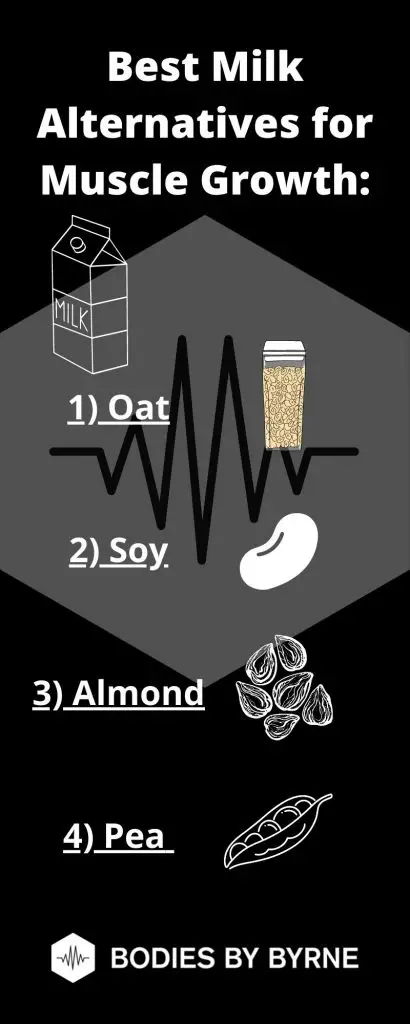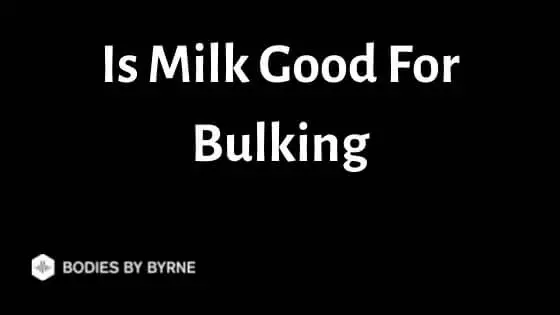When bulking, some people find it difficult to hit their daily required calories.
People deal with this in many ways, such as waking up earlier, eating smaller meals more frequently, or some people try to drink as much of their calories as they can. More specifically through mass gainers or/and milk.
Milk has a relatively good nutrient profile that can really help you through your bulking phase, however like most foods it has its negatives. So, is milk good for bulking, or you should stick to your traditional whole foods?
We’ll be answering that below and for a spoiler, milk is a good option for bulking but so are the modern milk alternatives…
What is Milk?
For those who don’t know, milk is one of the primary products of a cow which is mainly made up of water, fat, protein, and carbs.
Alongside this, milk is known to be one of the richest sources of calcium which alone carries great nutritional benefits. Some of these include strengthening bones and teeth, muscle contraction, nerve signals, and preventing blood clotting.
Milk also comes in different fat content variants. These are commonly bought as Whole Milk, Skimmed Milk, and Semi-Skimmed Milk (in the UK at least).
Almost all these options contain around 8g of protein per cup. The difference comes with the fat content where whole milk is the highest in fat, and skimmed milk is the lowest.
On top of that, there are further variations of milk such as almond milk, soy milk, oat milk, or coconut milk. Coconut milk contains almost no protein so is not a popular milk choice when bulking, while almond milk has very little fat so these milk variations can vary wildly.
The benefit is that they can be swapped around to suit your macro ratio plan but more on this later/
Depending on your goals, these other milk types may not be the best for gaining size quickly, however, are definitely healthier if a lean bulk is your chosen pathway.
How Many Calories are in Milk?
While bulking, you are trying to get in as many calories as you can to gain as much size and muscle as you can.
Drinking calories is a popular method as it’s known as one of the easiest ways to digest them. The liquid with the most calories (or at least most favorable for muscle growth) is milk or a milk-based drink such as a protein shake or milkshake.
Here are the exact macros for 100ml of whole milk.
| Typical Values | Per 100ml | Per 200ml | % based on RI for Average Adult |
| Energy | 277kJ | 553kJ | – |
| 66kcal | 132kcal | 7% | |
| Fat | 3.7g | 7.4g | 11% |
| Saturates | 2.4g | 4.8g | 24% |
| Carbohydrate | 4.7g | 9.4g | 4% |
| Sugars | 4.7g | 9.4g | 10% |
| Fibre | <0.5g | <0.5g | – |
| Protein | 3.5g | 7.0g | 14% |
| Salt | 0.11g |
As you can see from the table, a lot of protein, a lot of fat, but most importantly, a lot of calories.
Within just 100ml, Whole milk offers a whopping 66 calories. This means that in a 500ml glass, you can take in around 330 easily digestible calories**. This can be a huge boost to anyone’s meal plan.
** Easily digestible as long as you’re in the percentage of the population that can comfortably digest dairy that is.
One glass with your morning oats, alongside a 500ml serving with your protein shake, can be massive for anyone struggling to reach their daily calorie goals. That can be up to 660 extra calories, without counting the calories in your protein powder or mass gainer.
Is Milk Good for Bulking?
Before answering this, you need to ask yourself a question. What is the reason for you needing to incorporate milk?
If you struggle to reach your daily calorie goals, whether this is due to high metabolism or low appetite. Then yes, milk is a great way to consume the remaining calories.
Its consistency allows it to be a lot easier to drink than thicker liquids like a protein shake. It has great protein content, carbohydrates, and calcium. Milk is also one of the best bulking foods on a budget and per serving, is one of the cheapest options for a student of budget bulk.
However, if you find bulking easy, and find no difficulty in eating your daily calories and gaining weight, then I believe there is no need to add milk in addition to this.
There are plenty of nutrient-rich whole foods that if possible to eat, will be a much healthier and optimal choice than drinking over a liter of milk a day.
Drinking an obsessive amount of milk with a low metabolism will just lead to unwanted weight gain, and make the cutting process longer than it needs to be. If you can consume the calories through clean whole foods, then that is the better option.
This has been one of the benefits and drawbacks of using milk to bulk up over the years. Starting Strenght would recommend consuming 1 gallon of milk per day when following their muscle-building routine.
People definitely say results in terms of muscle size but that’s because of how easy it was to guarantee a calorie surplus when doing this.
Modern-day training allows us to count macros and calories with ease though so there is no reason why you’d need to follow this kind of basic approach which would likely lead to more fat gain than needed.
How to Drink Milk While Bulking
There are a variety of ways to consume milk while bulking with some being slightly more time-consuming than others.
In honesty, the ease of consuming milk and its versatility make it perfect for bulking – regardless of how you consume it.
The first way is the most obvious way, just drink it. A glass of milk is a very easily digestible way of getting in calories alongside great macros. It’s cheap, accessible, and quick to prepare, and if you really want to you can drink it straight out of the bottle.
A glass of milk will be down in less than a minute and is my preferred way to consume it.
The next two options are some of the more common ways to be consumed. These are either with protein powder in a shake or with cereal/ oats. Both are great as they allow you to add additional calories on top of your regular serving.
Related – Are oats good for bulking
Out there you will find some great healthy cereals that will help towards your carbohydrate daily intake, while also sometimes including additions such as fruit and nuts.
Having it with a shake is arguably the best option. Blending it with oats, whey protein, nut butter, honey, berries, and fruit (though not necessarily all at once), means you can get a high calorie and easy-to-consume meal with a great macronutrient and micronutrient profile.
Whole food is going to be what the majority of your diet should be made up of but a high-calorie shake can definitely be helpful in getting your surplus.
A far less healthy version is flavored milk but more specifically, chocolate or banana.
I would only recommend this to people with extremely low appetites, who don’t like the taste of regular milk.
Due to its higher sugar content, this needs to be consumed with extreme moderation. This variation should be seen as a last resort as the macro ratios are just not that friendly, even for a bulk.
See also – Best dirty bulking foods
Milk Alternatives for Bulking

As stated earlier, there is a wide variety of milk substitutes. These can be for people who are lactose intolerant, have other allergies, or just don’t like the taste. In honesty, not everyone gets on great with milk.
A very large percentage of the population can’t digest dairy very well (around 35% of the entire population)
If you are lactose intolerant, then there are a few options out there for you. Soy milk, almond milk, rice milk, or lactose-free milk are all great alternatives. They carry similar nutritional value and still stand as a viable way of drinking calories.
As said before, flavored milk should be seen as a last resort. It carries similar fat and protein as regular milk, however, holds a lot more sugar. This should only be used as an alternative if you truly struggle with eating your required daily calories.
Lastly, probably the worst tasting option is protein powder and water. This will have a much thinner consistency in comparison to a protein shake made with milk.
This will contain a decent amount of protein, however, this can not be relied on as your primary source of protein. Instead, your main intake should be from clean whole foods.
Conclusion
To conclude, milk can be a great addition to your meal plan by enabling you to reach your calorie goals with more ease.
However if avoidable, then I would recommend it due to its high fat levels. Unless you opt for a much lower fat version, you may gain unwanted weight which is not ideal during a clean bulk.
For someone with a high metabolism, who finds it difficult to gain weight, I would recommend full-fat milk due to its calorie density. However, if you have no issue with gaining weight while bulking, or have a big appetite and just want to consume calories quicker, I would recommend either skimmed, semi-skimmed, or any other variant with lower fat content.
This is because you will gain the extra fat a lot easier, which only makes your cutting process longer.
For some people, milk is seen as the holy grail and plays an instrumental part in their weight gain journey. However, for others, it is just a bad habit that causes more hassle than it’s worth.
Check out:
Best bulking foods for hardgainers
